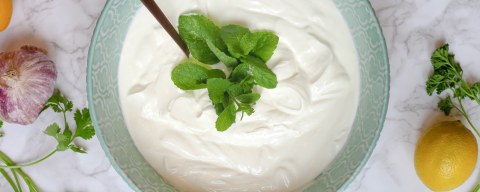What's the Difference Between Prebiotics and Probiotics? And Should You Take Them?
Probiotics are living microscopic organisms that we eat and live within our digestive system.1 Essentially, probiotics are the good bacteria inside of some foods.
Prebiotics, on the other hand, are not food for us, but food for the good bacteria in our intestines. The most common prebiotics are fiber our body is not able to digest and use for energy. However, the good bacteria inside our gut can eat and use them for energy.2
Positive benefits of good bacteria in our intestines are:
- Help us digest more of the food we eat
- Fight off bad bacteria
- create essential vitamins.3
While we know that good bacteria in our gut is beneficial for us, we still have a lot to learn about how eating pre- and probiotics specifically helps our digestive system. A 2019 study found that currently there is not enough evidence to recommend that all healthy adults should take a probiotic supplement.4 However, some medical conditions, such as diarrhea or irritable bowel syndrome (IBS), have more research that support consuming probiotics may relieve symptoms. Talk to your doctor or a Registered Dietitian Nutritionist (RDN) if you have questions about whether pre- or probiotics can help manage your symptoms.1
"I'm interested in adding pre- and probiotics! where do I start?"
It is exciting that you are interested in including more pre- and probiotics in your diet! In nutrition, we like to use the phrase "food first." This essentially means that we want you to try to get nutrients from foods before using a supplement. While there are many supplements available at the supermarket, the first plan of action should be to look at foods high in pre- and probiotics and start eating them. Food certainly tastes a lot better than a pill! Another important consideration is that most prebiotic and probiotic supplements are not regulated by the Food and Drug Administration (FDA).1 This means that the products have not been proven to be effective and may not contain all of the products listed on the label. Supplements are not inherently bad, but it is helpful to know that they have not been tested and may not be worth the cost.
Since fermented foods rely on live bacteria, probiotics can be found in many fermented foods. Some examples are sauerkraut, kimchi, yogurt and kombucha.5 It is hard to compare fermented food to one another solely based on the amount of probiotics because the packaging and preservation process may kill some of the live bacteria.5 Rather than trying to find the best probiotic source, it is a better idea to eat a wide variety of foods and include fermented foods when possible. Eaing pre- and probiotics sources consistently is key to maintain the additional benefits.
Less is known about what foods contain prebiotics. Prebiotics are often specific types of fiber (which has its own benefits on our bodies!). If you are consuming a diet rich in different fiber sources (fruits, vegetables and whole grains), you are probably getting plenty of prebiotics.6 Some examples of foods that contain prebiotics are oats, garlic and soybeans.6
If you are interested in pre- and probiotics, start by including more food sources into your diet and see if you notice any beneficial changes! If you have a health condition that could benefit by increasing pre- and probiotics, speak to your doctor or a Registered Dietitian Nutritionist about your options.
References
- National Center for Complementary and Integrative Health. (2019, August). Probiotics: What you need to know. National Institutes of Health. https://www.nccih.nih.gov/health/probiotics-what-you-need-to-know
- Gibson, G. R., Hutkins, R., Sanders, M. E., Prescott, S. L., Reimer, R. A., Salminen, S. J., Scott, K., Stanton, C., Swanson, K. S., Cani, P. D., Verbeke, K., & Reid, G. (2017). Expert consensus document: The International Scientific Association for Probiotics and Prebiotics (ISAPP) consensus statement on the definition and scope of prebiotics. Nature Reviews Gastroenterology & Hepatology, 14(8), 491–502. https://doi.org/10.1038/nrgastro.2017.75
- Cleveland Center. (2020, March 9). Probiotics. https://my.clevelandclinic.org/health/articles/14598-probiotics
- Khalesi, S., Bellissimo, N., Vandelanotte, C. et al. A review of probiotic supplementation in healthy adults: Helpful or hype?. Eur J Clin Nutr 73, 24–37 (2019). https://doi.org/10.1038/s41430-018-0135-9
- Office of Dietary Supplements. (2021, December 22). Probiotics: Fact sheet for health professionals. https://ods.od.nih.gov/factsheets/Probiotics-HealthProfessional
- Davani-Davari, D., Negahdaripour, M., Karimzadeh, I., Seifan, M., Mohkam, M., Masoumi, S. J., Berenjian, A., & Ghasemi, Y. (2019). Prebiotics: Definition, types, sources, mechanisms, and clinical applications. Foods, 8(3), 92. https://doi.org/10.3390/foods8030092

Check Out Our New Health & Well-Being Page
Our specialists help create healthy people and healthy places in New Hampshire.
Featured LINK
Mental Health Resources for New Hampshire - a printable county-specific guide to help New Hampshire residents find local, state, and national mental health resources.
